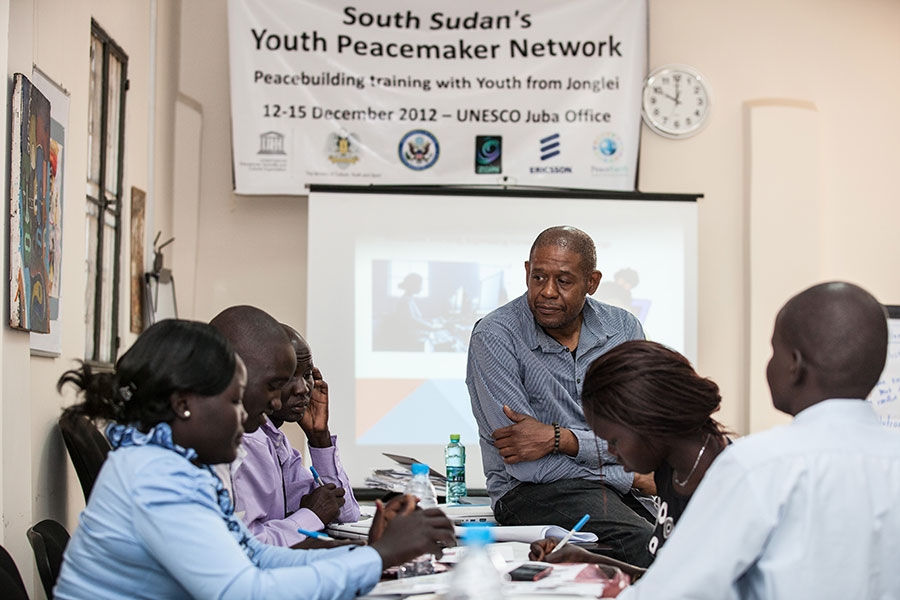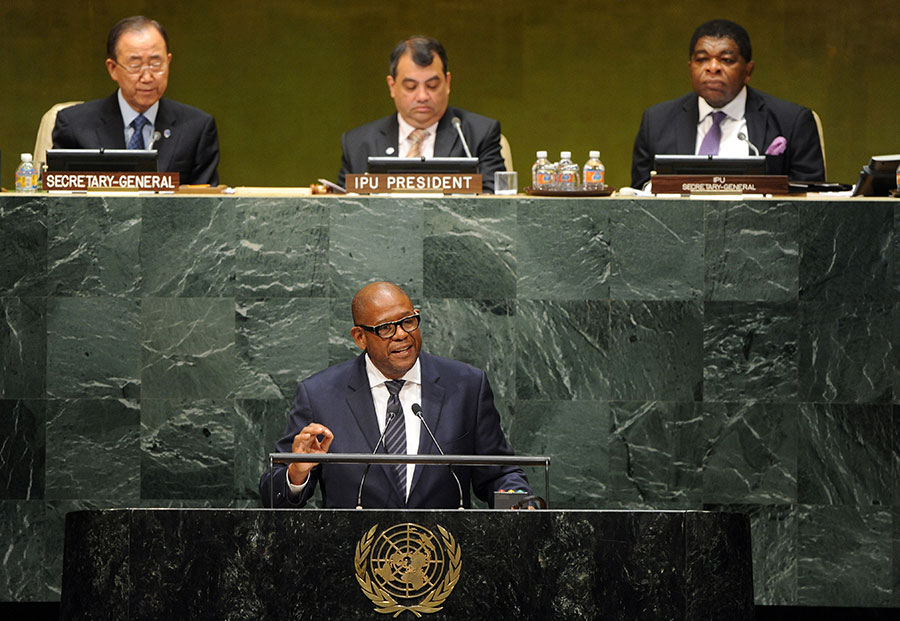- A chance meeting with a former child soldier in Uganda makes Forest Whitaker want to devote his life to peace.
- He sees a direct link between violence anywhere in the world – gangs in Los Angeles or rebel soldiers in Africa.
- Childhood exposure to compassion, empathy and violence make Whitaker the activist for good that he is today.
- Giving up is never an option because you will fail untold thousands of people in the future.
Forest Whitaker was in Uganda filming The Last King Of Scotland in 2005 when he met Sam Okello a former child soldier, whose brother had been taken by the Lord’s Resistance Army, a cult-like military group notorious for its brutality and exploitation of children in conflict. Okello had started a rehabilitation centre for child soldiers and Whitaker decided he couldn’t sit on the side-lines as an observer. The film script that Whitaker was studying told of a Scottish doctor that became the personal physician of Ugandan dictator Idi Amin, played by Whitaker. The Hollywood star did not realize at the time that he too would form an on-going relationship with the people of that country, and act out a humanitarian role that would be the exact opposite of the brutal dictator he portrayed in the film.
This experience led him to form the Whitaker Peace & Development Initiative, that works with young people in areas of conflict to try and create stability and opportunities. His motivation for creating a peace initiative had to do with a deeper understanding of the roots of conflict, based on a hands-on experience with communities around the world.
“Because of the historical research I had to do for my role in The Last King Of Scotland I really got to understand more deeply the issue of colonialism in Africa and what that can do to a culture,” says Whitaker. “I also learned more about the multi-faceted issues of tribalism and was lucky to meet many individuals who helped me get to the core of what those differences were; that can ultimately lead to conflict.”
Whitaker had already been working with gangs in Los Angeles and on resolving domestic abuse issues, but while in Uganda, he made a connection between the child soldiers he met and the gang members back home. He saw that violence perpetrated on opposite sides of the world, and in unrelated countries and cultures, can actually be traced to the same origin within people.
Growing up in Los Angeles, Whitaker witnessed riots during the civil rights movement, the rise of the Black Panther party and the influence of leaders such as Martin Luther King.
“The Black Panthers in my community organized educational programs for kids and something about that resonated with me,” says Whitaker. “The idea of taking care of each other was appealing.”
Another lesson in caring was given by his mother, who taught at a school for the mentally challenged. She allowed Whitaker to help her with kids that had cerebral palsy. “I really learned how to care for people by watching my mother interact with autistic children,” he says.
These early lessons in compassion, and his exposure to conflict, made Whitaker want to establish something more lasting and effective. He’d been searching for a way to formalize his ideas and it came in the form of his peace initiative. The Whitaker Peace & Development Initiative now has programs in Uganda, South Sudan, Mexico and the United States, each with a strong focus on youth development and touches the lives of hundreds of thousands of young people. His influence as a celebrity wanting to create positive change didn’t go unnoticed, and in 2011 he was made a UNESCO Goodwill Ambassador for Peace and Reconciliation. UNESCO has strengthened his role on the ground by designating him in 2014 UNESCO Special Envoy for Peace and Reconciliation. U.S. ambassador to UNESCO David Killion described Whitaker as a “perfect choice as a Goodwill Ambassador. He has exemplified compassion in every area of his life, with humility and grace. He does this because it’s the right thing to do.”
Talking at an organization of international significance was great for highlighting the cause, but Whitaker wanted a partnership with people on the ground, to directly move things forward with people living with conflict on a daily basis. He is often found listening intently to ordinary people and their problems, helping them dissolve prejudice and fear and replacing it with compromise and understanding.
Peace is hard work, and he is sometimes in despair at what he sees, only to realize later that good can always be found among the bad. “When I set up the Whitaker Peace & Development Initiative in South Sudan we found millions of people displaced,” says Whitaker. “It was tough to establish an effective program when our first priority was to ensure people’s physical safety. It was amazing to see the youth we had trained working as a unit. Even if few may have joined the opposition forces, they might call a girl from another town to warn them about approaching danger, helping them get to safety in time.”
It’s lessons like these that have stopped Whitaker from giving up, even when the going gets really tough. “There have been difficult decisions to make, but sometimes I have decided to not only continue, but even expand the program,” he says. “I have learned how to really listen and work towards a mutually positive goal.”
Whitaker tells of a Danish guy who was running a restitution program for child soldiers. The young boy he’d placed back in his home had killed his sister and he was closing the programme because he was devastated. Sometimes taking a tragedy too personally can mean untold thousands might never benefit from your good work.
“Successful mediation requires that you first create the rules of engagement before you even sit down to negotiate,” says Whitaker. “Then you should find a place of common ground, right down to the situation at hand. It’s a process that will shift and change but it has to happen. People are frightened of what they don’t understand and operate from a gut instinct of survival,” he says.
“Peace is built piece by piece. All the small pieces of good, brought together, can overwhelm the world,” says Whitaker. “It’s important to recognise that the youth are our present and our future and we have to give them voices and opportunities. It’s through them that peace will move forward and be sustained.”
“When I was a kid my mother wanted me to go to church on Sundays. I asked her why I had to believe what she believed in. She gave me the best advice I’ve ever received. She told I didn’t have to believe in what she believed, but that I had to believe in something. You need to get out of bed every day and find what it is that you believe in. That’s really important to me.”
To learn more about Forest’s work with the Whitaker Peace & Development Initiative (WPDI): www.wpdi.org @ForestWhitaker







































